Key takeaways:
- Establishing a daily routine and integrating self-care practices can significantly enhance mental wellbeing during isolation.
- Effective prioritization of tasks, using methods like the Eisenhower Matrix, helps reduce overwhelm and boost motivation.
- Creating a personalized task list based on energy levels and adaptability to daily changes keeps productivity relevant and manageable.
- Maintaining motivation through small goals, accountability groups, and journaling progress fosters a sense of achievement and community support.
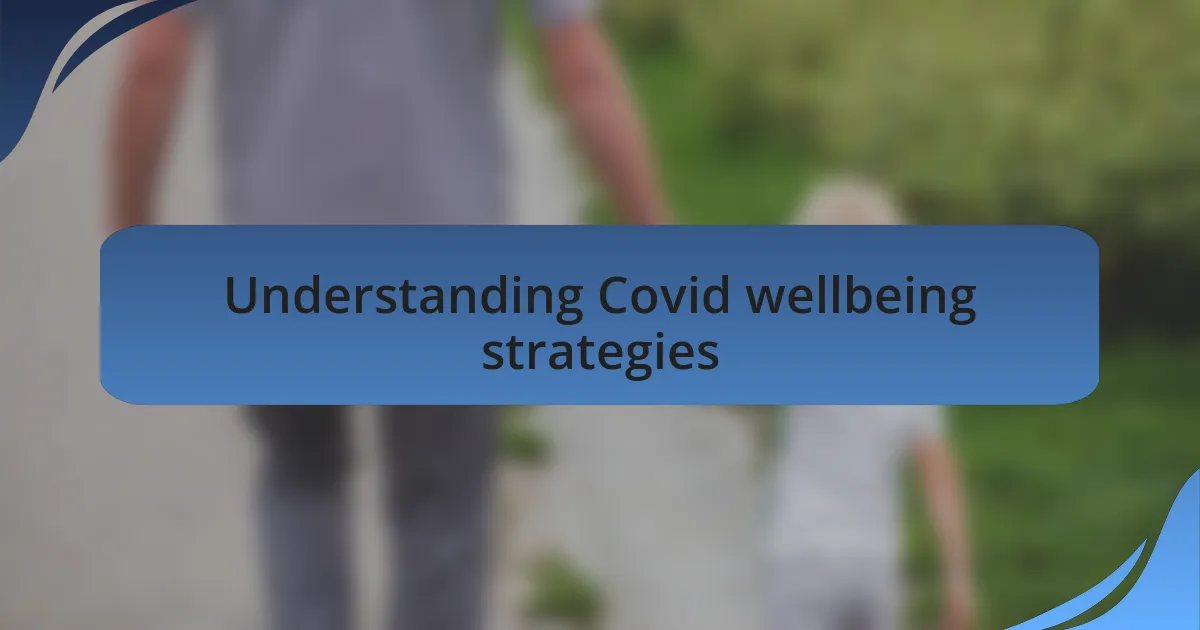
Understanding Covid wellbeing strategies
One of the most effective Covid wellbeing strategies I discovered during isolation was the importance of establishing a daily routine. When the world outside felt chaotic, having a structured day brought a sense of normalcy that I desperately needed. It was a relief to wake up, have breakfast, and tackle tasks with purpose, instead of feeling adrift.
In my experience, integrating self-care practices into my daily routine transformed my mental state. I remember one day when yoga seemed trivial, but after just fifteen minutes, I felt a wave of calm wash over me. How often do we overlook simple activities that hold the power to shift our mindset? Embracing those moments has been vital for my wellbeing.
Another strategy that emerged for me was connecting with others, even if remotely. I recall hosting a virtual coffee chat with friends, where we shared our struggles and successes. Isn’t it comforting to realize that we’re all in this together? Those genuine conversations have a way of building resilience and reminding us that isolation doesn’t mean we have to be alone in our feelings.
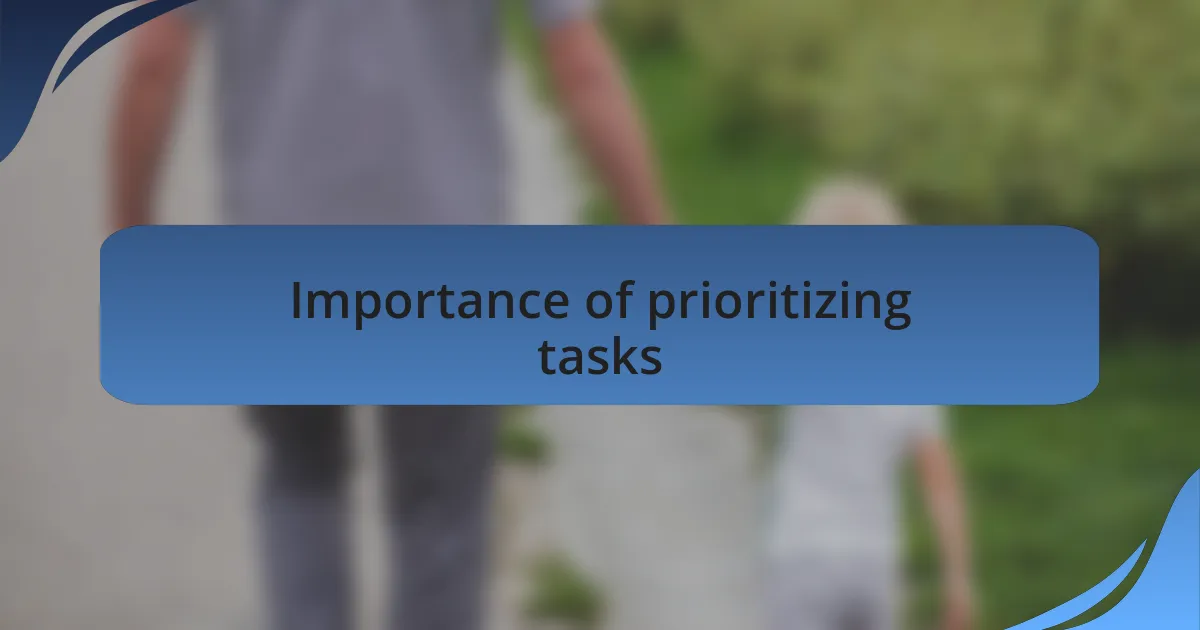
Importance of prioritizing tasks
Having clarity about what tasks are essential can significantly reduce feelings of overwhelm. During my time in isolation, I often found myself staring at a lengthy to-do list without knowing where to start. I learned that by identifying my top priorities—whether it was work-related tasks or personal projects—I could focus my energy where it mattered most. Doesn’t it feel better to tackle a few important things rather than adding stress by trying to do everything?
It quickly became evident to me that effective prioritization could also boost my motivation. I remember one afternoon, feeling unproductive and restless, I chose to work on a project that excited me instead of forcing myself through mundane chores. That shift in focus energized me and ultimately led to greater productivity. Isn’t it fascinating how embracing what we enjoy can create a ripple effect, enhancing our overall wellbeing?
As I navigated those isolated months, I realized that prioritizing tasks isn’t merely an organizational tool; it’s an act of self-care. By giving myself permission to say no to less critical tasks, I was able to invest my time and energy in things that truly resonated with me. This revelation made me wonder: how often do we allow distractions to sideline our true passions? Acknowledging what genuinely matters can be a pivotal step towards reclaiming our sense of balance and purpose.
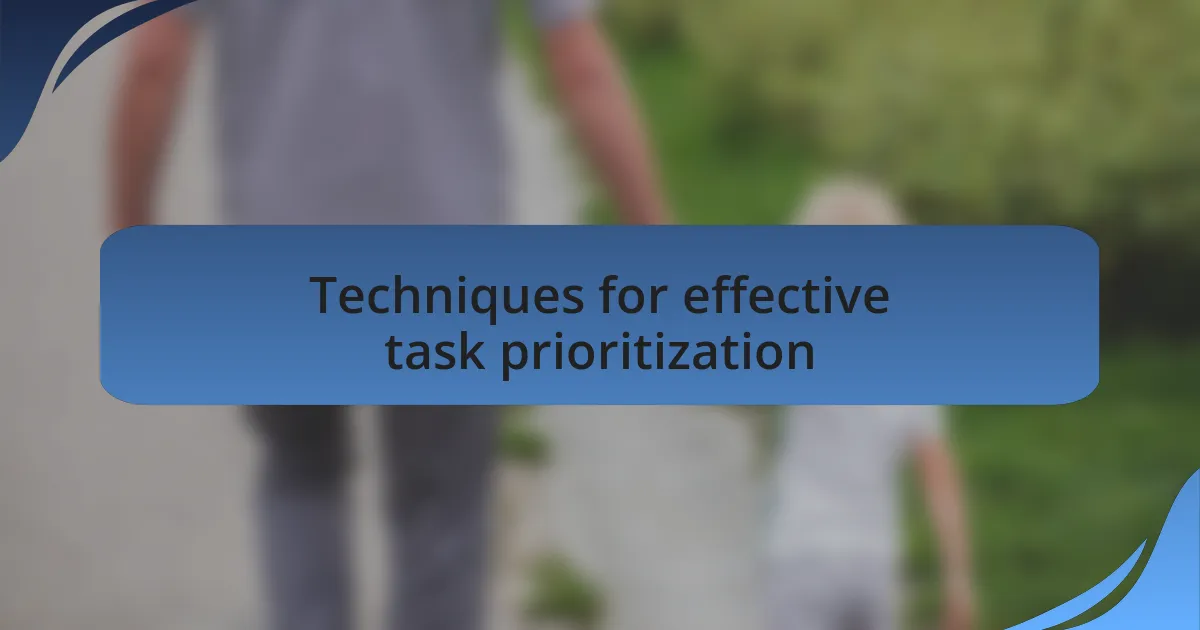
Techniques for effective task prioritization
Choosing the right techniques for effective task prioritization can profoundly impact our productivity. One method I found particularly useful is the Eisenhower Matrix, where tasks are divided into four categories: urgent, important, non-urgent, and not important. Using this approach, I distinctly remember realizing that many tasks I thought were urgent were merely distractions—like scrolling through social media instead of tackling my overdue assignments. Have you ever wasted your precious time on tasks that didn’t really matter?
Another strategy involves breaking larger tasks into smaller, more manageable steps. I remember feeling overwhelmed by a big project and almost giving up before I began. By dividing it into bite-sized pieces, I celebrated each small accomplishment, which kept my momentum going. It’s amazing how a few completed steps can lift our spirits, right?
Lastly, implementing time blocking has transformed how I allocate my day. Scheduling specific time slots for each task has prevented me from falling into the trap of multitasking—a habit I realized only led to frustration and confusion. When I find myself segmenting my day, I often reflect on how much more satisfying it is to commit to one thing at a time, don’t you agree? Embracing these techniques not only keeps me organized but also nurtures a sense of achievement.
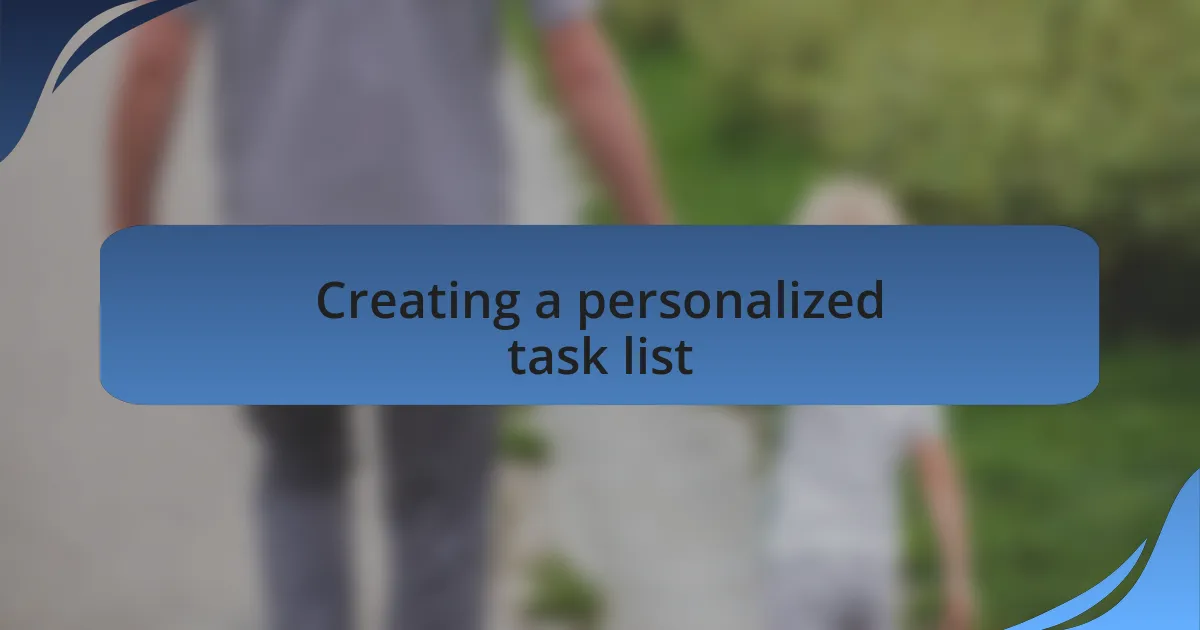
Creating a personalized task list
Creating a personalized task list begins with understanding what truly matters to you. When I find myself overwhelmed, I take a moment to reflect on my goals and priorities. This reflective process helps shape my list, allowing me to pinpoint tasks that resonate with my personal and professional aspirations. Are you focusing on what genuinely adds value to your day, or are you caught up in the noise?
Once I have a clear sense of my priorities, I jot them down in a way that feels intuitive. I often categorize my tasks based on my energy levels throughout the day. For instance, I tackle challenging tasks in the morning when I’m most alert, saving simpler ones for the afternoon slump. Have you noticed how your energy ebbs and flows? Tuning into that rhythm can make a significant difference in productivity.
After crafting my list, I revisit it regularly, tweaking as necessary. Life is dynamic, and I’ve learned that flexibility is key. I make it a habit to ask myself, “What has changed?” Always adjusting my priorities allows me to stay aligned with my evolving circumstances and personal growth. This practice not only keeps my tasks relevant but also ensures I remain engaged and motivated.
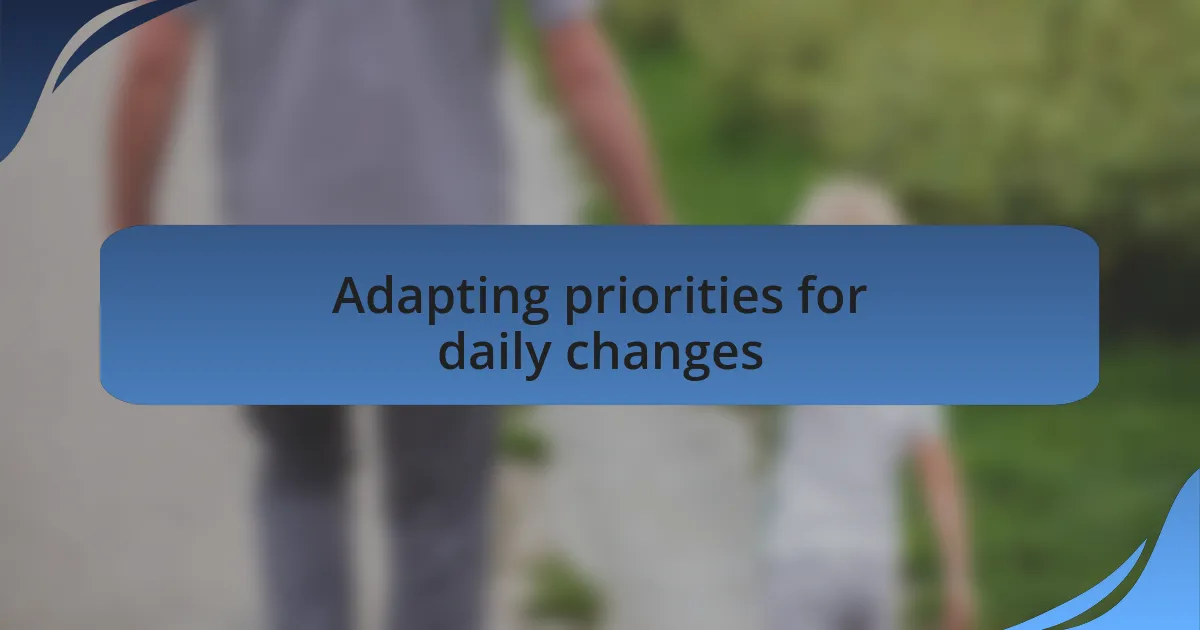
Adapting priorities for daily changes
Adapting my priorities on a daily basis has become essential, especially in these unpredictable times. Some days, unexpected events can throw my entire schedule off balance. For example, I once planned a full day of work only to have a family member need support due to increased stress. In that moment, I realized I had to shuffle my priorities, focusing on being present for them instead of sticking rigidly to my list.
I’ve realized that sometimes, the tasks I considered urgent can be put on the back burner. When I face changes in my daily routine, I take a deep breath and assess what truly needs my attention. This practice doesn’t just ease my anxiety; it also brings clarity to what must be done in the moment. Have you ever felt the weight of tasks that aren’t as pressing as they seem? By letting go of that pressure, I find that I can engage more fully with what matters right now.
As I adapt my priorities, I often find myself reflecting on my emotional state. If I’m feeling drained, I shift my focus toward lighter tasks that still contribute to my overall goals. I remember a day I was just too fatigued to tackle complex work but had some creative ideas swirling in my mind. Pivoting my task list that day allowed me to engage with my creativity instead, ultimately leading to a breakthrough that helped my project. Have you tried reshaping your task list based on your emotional energy? I encourage you to explore this approach; it can lead to unexpected rewards and insights.
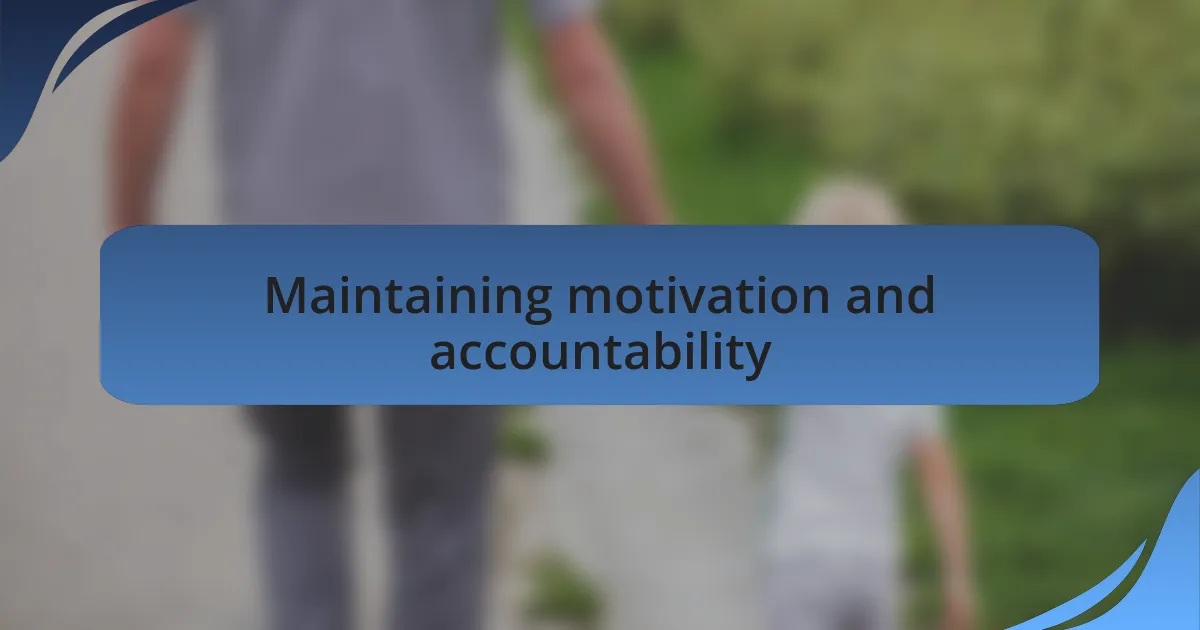
Maintaining motivation and accountability
Staying motivated while working in isolation can be a challenge. I’ve found that setting small, achievable goals really helps me stay on track. For instance, when I set a goal to read just a few pages of a book each day, it felt less daunting, and I often found myself wanting to read more. Have you experienced the satisfaction of completing a small task? It can create momentum that carries you through the day.
Accountability plays a crucial role in maintaining that motivation as well. I remember when I joined a virtual accountability group during lockdown. We shared our weekly goals and checked in on each other regularly. Those commitments kept me accountable, and the support from fellow members turned routine tasks into shared experiences. Have you considered leveraging a community for your goals? Connecting with others can provide a sense of belonging that boosts both motivation and commitment.
To enhance my own accountability, I started journaling my daily progress. Each evening, I jot down what I accomplished, reflecting on how I felt about each task. This not only gives me a sense of closure for the day but also helps me recognize patterns in my productivity. Have you tried keeping track of your daily wins? Seeing your progress laid out in front of you can be immensely rewarding, reinforcing the effort you’ve invested in maintaining your goals amidst the challenges of isolation.